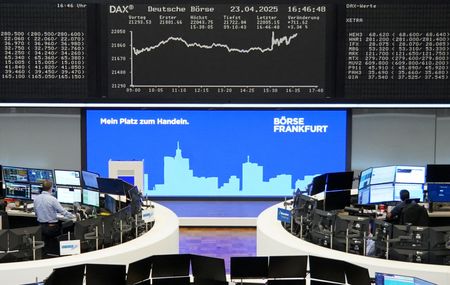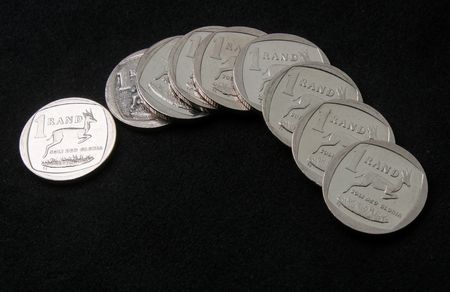By Caroline Valetkevitch
NEW YORK (Reuters) – Major stock indexes rose, the dollar gained against the euro and other currencies while safe-haven gold dropped on Wednesday as the Trump administration signaled a willingness to de-escalate its trade war with China.
U.S. Treasury Secretary Scott Bessent said that high tariffs between the United States and China are not sustainable, while U.S. President Donald Trump signaled he was open to easing trade tensions between the world’s two largest economies.
A person familiar with the conversations said the White House is open to discussing a significant rate cut on Chinese imports in order to advance negotiations with Beijing but will not do so alone.
Adding to the upbeat market tone, Trump late on Tuesday backed off from threats to fire Federal Reserve Chair Jerome Powell.
“A softening of the stance on tariffs and trade policy with China and maybe a signal of willingness to try to find a deal, to walk back from the peak tensions, is exactly what the market wants to hear,” said Jim Baird, chief investment officer at Plante Moran Financial Advisors in Southfield, Michigan.
Trump’s multi-front tariff war has roiled markets in recent weeks as investors worried it could push the economy into recession, while his criticism of Powell has added to investor concerns about U.S. assets.
Some earnings news in the U.S. and elsewhere also buoyed stocks on Wednesday. Boeing shares rose 6.1% after the company reported a smaller-than-expected quarterly loss.
The Dow Jones Industrial Average rose 419.59 points, or 1.07%, to 39,606.57, the S&P 500 rose 88.10 points, or 1.67%, to 5,375.86 and the Nasdaq Composite rose 407.63 points, or 2.50%, to 16,708.05.
Shares of Tesla jumped 5.4% even though the company reported results that missed analyst forecasts. Tesla boss Elon Musk said on a call with analysts he would significantly reduce his involvement in work at the Department of Government Efficiency from next month to focus more on his many companies.
Among the 11 major sectors of the S&P 500, tech and consumer discretionary notched the biggest percentage gains, while consumer staples and energy lagged.
MSCI’s gauge of stocks across the globe rose 11.95 points, or 1.50%, to 808.21. The pan-European STOXX 600 index ended up 1.78%.
After hitting record highs in recent sessions, spot gold slipped 3% to $3,281.6 an ounce.
The dollar climbed 1.27% against the yen to 143.435. Against the Swiss franc, the dollar was last 1.32% stronger at 0.8298. The euro eased 0.86% to $1.132, pulling back from the $1.15 levels earlier this week which marked a high of roughly 3-1/2-years.
Benchmark 10-year yields – which move inversely to prices – declined meaningfully earlier on Wednesday, in a partial reversal of the concerns that hit investors over the past few weeks because of Trump’s changing trade and economic policies.
The bond rally, though, lost some steam during the day as economic data released on Wednesday was mixed, with some surprises to the upside.
Among them, a U.S. Department of Commerce reading of home sales for March was stronger than anticipated.
Benchmark 10-year Treasury yields were last at 4.385%, a touch lower than on Tuesday. Further out, 30-year yields declined by about five basis points to 4.83%.
Citadel’s founder and CEO Kenneth Griffin said that Trump’s administration needs to be careful about potential damage to the creditworthiness of U.S. Treasuries.
Oil ended lower, with U.S. crude falling $1.40 to settle at $62.27 a barrel, while Brent crude declined $1.32 to settle at $66.12.
(Additional reporting by Amanda Cooper in London and Wayne Cole in Sydney and Lewis Krauskopf in New York; editing by Tom Hogue, Bernadette Baum, Gareth Jones, Mark Heinrich, Cynthia Osterman and Sandra Maler)









